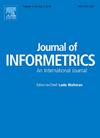整合与分离:传染病资助与非资助研究的跨学科网络分析
IF 3.5
2区 管理学
Q2 COMPUTER SCIENCE, INTERDISCIPLINARY APPLICATIONS
引用次数: 0
摘要
跨学科研究推动创新。在本文中,我们考察了由资助驱动的研究产出的跨学科性。考虑到36种主要传染病,我们基于1995-2022年资助和未资助的研究,通过时间相关网络建立跨学科模型。通过分层聚类,我们确定了以疫苗接种或寨卡病毒爆发等重要研究课题为特征的连贯时期或制度。我们确定,受资助的研究比未受资助的研究更少跨学科,但随着时间的推移,这种影响显著下降。在网络增长方面,我们发现受资助的研究倾向于关注容易建立的联系,从而导致划分和保守。相比之下,未获得资助的研究往往是探索性的,并将遥远的知识连接起来,从而导致知识整合。我们的研究结果表明,对艾滋病毒和结核病等突出传染病的跨学科研究往往具有很强的桥接效应,促进了网络中的全球知识整合。在该网络的外围,我们观察到出现了与疫苗接种和寨卡病毒相关的知识集群,两者都具有有限的系统性影响。我们进一步表明,尽管与COVID-19相关的出版物激增,但其对疾病网络的系统性影响仍然相对较低。总的来说,本研究提供了一个概括性的框架来检验资助对跨学科知识创造的影响。它可以协助确定优先事项,例如对新的和正在出现的健康威胁进行水平扫描,例如大流行病规划。决策者、资助机构和研究机构应考虑改革评估体系,以奖励跨学科工作,并实施促进和支持明智冒险的机制。本文章由计算机程序翻译,如有差异,请以英文原文为准。
Integration vs segregation: Network analysis of interdisciplinarity in funded and unfunded research on infectious diseases
Interdisciplinary research fuels innovation. In this paper, we examine the interdisciplinarity of research output driven by funding. Considering 36 major infectious diseases, we model interdisciplinarity through temporal correlation networks based on funded and unfunded research from 1995-2022. Using hierarchical clustering, we identify coherent periods of time or regimes characterised by important research topics like vaccinations or the Zika outbreak. We establish that funded research is less interdisciplinary than unfunded research, but the effect has decreased markedly over time. In terms of network growth, we find a tendency of funded research to focus on readily established connections leading to compartmentalisation and conservatism. In contrast, unfunded research tends to be exploratory and bridge distant knowledge leading to knowledge integration. Our results show that interdisciplinary research on prominent infectious diseases like HIV and tuberculosis tends to have strong bridging effects facilitating global knowledge integration in the network. At the periphery of the network, we observe the emergence of vaccination-related and Zika-related knowledge clusters, both with limited systemic impact. We further show that despite the surge in publications related to COVID-19, its systematic impact on the disease network remains relatively low. Overall, this research provides a generalisable framework to examine the impact of funding in interdisciplinary knowledge creation. It can assist in priority setting, for example with horizon scanning for new and emerging threats to health, such as pandemic planning. Policymakers, funding agencies, and research institutions should consider revamping evaluation systems to reward interdisciplinary work and implement mechanisms that promote and support intelligent risk-taking.
求助全文
通过发布文献求助,成功后即可免费获取论文全文。
去求助
来源期刊

Journal of Informetrics
Social Sciences-Library and Information Sciences
CiteScore
6.40
自引率
16.20%
发文量
95
期刊介绍:
Journal of Informetrics (JOI) publishes rigorous high-quality research on quantitative aspects of information science. The main focus of the journal is on topics in bibliometrics, scientometrics, webometrics, patentometrics, altmetrics and research evaluation. Contributions studying informetric problems using methods from other quantitative fields, such as mathematics, statistics, computer science, economics and econometrics, and network science, are especially encouraged. JOI publishes both theoretical and empirical work. In general, case studies, for instance a bibliometric analysis focusing on a specific research field or a specific country, are not considered suitable for publication in JOI, unless they contain innovative methodological elements.
 求助内容:
求助内容: 应助结果提醒方式:
应助结果提醒方式:


